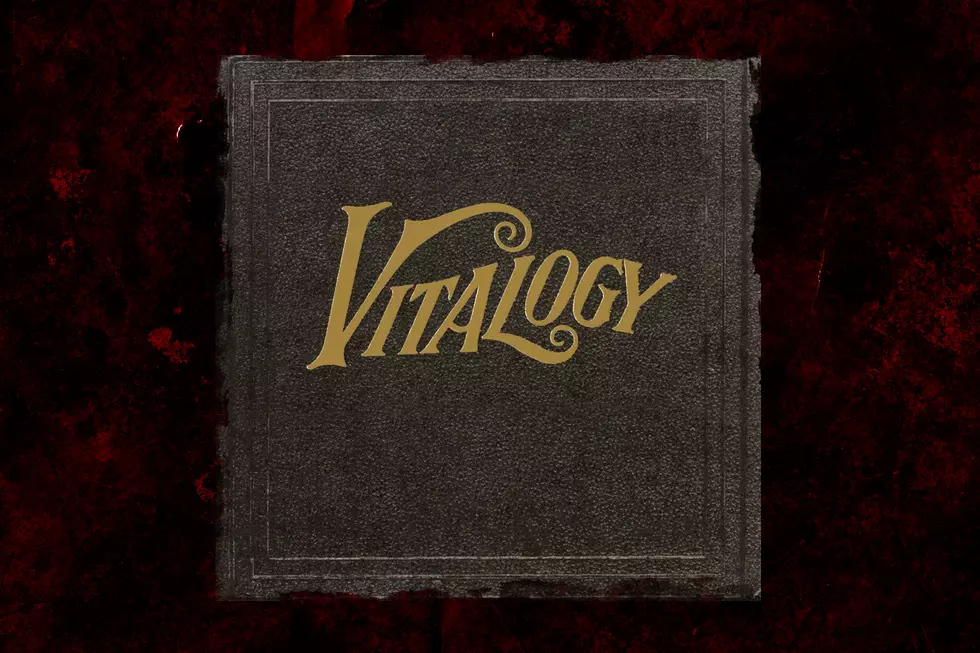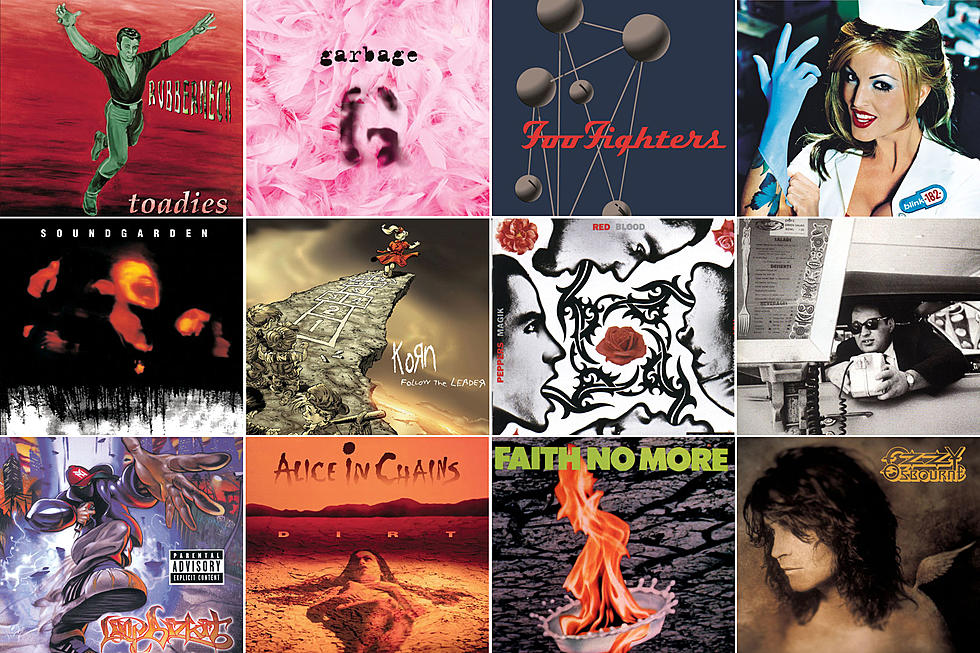
29 Years Ago: Pearl Jam Overcome Internal Strife to Release ‘Vitalogy’
Things couldn't have been better on the surface. Pearl Jam debuted to great acclaim with the Ten album, followed by setting opening week sales records with their follow-up Vs. and were one of the hottest tickets on tour. But there was plenty of drama behind the scenes as they made the transition to writing and recording their third album, Vitalogy.
"Vitalogy was a little strained," revealed producer Brendan O'Brien to Spin, adding, "I'm being polite -- there was some imploding going on." The disc was primarily penned while the band was on the road promoting their Vs. album and the dynamics in the group were changing. Stone Gossard, who was viewed as the band's creative force and leader early on was stepping back while Eddie Vedder asserted himself even more. The group also dealt with a growing alcohol and substance abuse issue with guitarist Mike McCready, made the decision to split with drummer Dave Abbruzzese and found themselves in the midst of a very public battle with ticketing giant Ticketmaster, forcing them to create their own alternatives in the ways of staging shows.
"Communication was at an all-time low," bassist Jeff Ament told Spin of the creative process at the time. With the band often stretched for time demands and barriers starting to form, the one place they could connect was jam sessions and scheduled studio time. Gossard told Musician, "It was probably the only record we could have made due to the problems we were going through in relating. We really weren't collaborating with each other at the time very much. So the only way we could make something happen was by going into the studio and deciding on it then and there, in the moment. Eighty percent of the songs were written 20 minutes before they were recorded. Eddie had 'Better Man' from a long time ago, but most of the songs were a result of jamming in the studio and coming up with a quick arrangement. It felt like what we needed to do to really break the band open."
As for making the decision for him to step back, the guitarist added, "If it had remained always my band, my natural tendency would have been to get more complex and arrange things more and more. That wouldn't necessarily be good for Eddie, or anyone else in the band. Of course, I enjoy being self-indulgent. [laughs] And I look forward to the time when I can become more indulgent with my songwriting. But this band is a family, and it's a process that we have to grow with together."
According to Gossard, Vedder becoming the band's leader was a gradual process. He explained, "There's no getting around the fact that Eddie is the man. As far as emotional and spiritual energy goes, he IS the leader of this band. But Eddie does not make all the decisions. Eddie can listen to reason; Eddie can be swayed or talked in or out of certain things. Eddie allows other people to lead in this band and to have certain roles that are very fundamental to the decision-making process. Eddie is a natural leader. Jeff and I have been very much in control of previous bands we've worked in. But the way Eddie grew into being the leader of this band was the most gradual, slow and respectful process that I've ever been involved in. That's not to say Eddie's never done anything malicious. But he never grabbed power for power's sake."
Pearl Jam, "Better Man"
With touring taking up a majority of the time, the band broke up their recording sessions. A late 1993 session in New Orleans yielded "Tremor Christ" and "Nothingman." They would also spend time in their native Seattle as well as Atlanta working and recording new music, before eventually retreating to Bad Animals studio in Seattle after their tour completion to finish things up.
Two key things happened during the recording to ensure the future of the band. First, guitarist Mike McCready decided to enter rehab. Gossard revealed, "Mike's a pretty awful drunk. Not that he got malicious or mean openly to people, but he would get out of control consistently. It was a difficult situation where you could find yourself blaming Mike for a lot of your own frustrations with the band when he was f--ked up or couldn't come to practice. And we're used to loving Mike and knowing how much fun and how talented he is. I got upset that he might throw away a great opportunity to be in a cool band and work it out. He decided to go into treatment and everyone was thrilled. How could you not be? Here was Mike taking responsibility for himself and his own happiness, going to a new level." After rehab, Gossard stated that McCready was "as raw as he ever was," but that it was a better situation for everyone and that they were thrilled to have him in the band.
Meanwhile, things came to a head with drummer Dave Abbruzzese. During recording, the drummer had to have his tonsils removed one day and the band managed to record the song "Satan's Bed" with his drum tech Jimmy Shoaf handling duties. Months later, personality conflicts with Abbruzzese took a toll and the band decided to part ways with the drummer. Gossard stated, "It was the nature of how the politics worked in our band: It was up to me to say, 'Hey, we tried, it's not working; time to move on.' On a superficial level, it was a political struggle: For whatever reason his ability to communicate with Ed and Jeff was very stifled. I certainly don't think it was all Dave Abbruzzese's fault that it was stifled." Eventually the band called upon Jack Irons, who had initially recommended Vedder to Pearl Jam, to help them complete the disc. Gossard recalled, "If we didn't find a drummer that everyone felt good about, it would have been difficult to keep moving forward. Jack's just a very generous and wise drummer. He concentrates on the groove of a song, and that allows everybody's heart to have a place to sit, and yet be part of the whole. He's very conscious of what everybody's playing. He's working to balance out all the elements of the band."
As stated, Vedder took on a bigger role with Vitalogy, not only in terms of writing, but also playing guitar more within the creative process. With Pearl Jam's success reaching new heights and attention being heaped upon the band, Vedder was careful not to let it overwhelm the creative process. "The only thing that worries me musically is that everything we put out is so under the microscope that it ends up seeping into the songs, and suddenly the music is bombastic just to be able to resist or survive the inspection," said Vedder to Spin. "There are things on Vitalogy that are definitely not typical, so I'm trying to battle against that. There's two ways: You either give the people what they want, or you become cynical and that protects you."
By the time the end of 1994 rolled around, the band was finally ready to release their third album. Vitalogy first arrived as a vinyl release on Nov. 22 and sold 34,000 copies its first week. That stood as an opening week record for vinyl until Jack White's Lazaretto in 2014. The more traditional release date for the CD version came on Dec. 6, 1994. It sold 877,000 copies the first week, which made it the second fastest selling album in music history at the time, only trailing the band's previous album Vs. in the record books.
Pearl Jam, "Spin the Black Circle"
Leading off the album was the release of the high energy rocker "Spin the Black Circle," issued in early November in advance of the album release. "I remember wanting everything to be faster," said Vedder to Rolling Stone. "Stone gave me this riff. I had a speed control machine. I speeded it up, came back and said, 'Can we do it this way?'" But the style didn't necessarily connect with all of Vedder's bandmates. Bassist Jeff Ament told NME, "I was like, 'Ugh ... I can't play the entire Dead Kennedys back catalogue!' I didn't really want to make music like that at the time." Meanwhile, McCready told Guitar School that the track proved to be one of the more challenging songs for him. "I actually overdubbed those leads, but when I do it live, that riff is so hectic and frantic, I have to be warmed up or it sounds really sh--ty," said the guitarist. The song would be the lone Vitalogy track to crack the Billboard Top 40, reaching No. 18 on the charts. It would top out at No. 16 on the Mainstream Rock charts and No. 11 at Modern Rock. But "Spin the Black Circle" would give the band their first Grammy Award, winning at the 1996 ceremony for Best Hard Rock Performance. Not exactly wowed, Vedder stated upon acceptance, "I don't know what this means. I don't think it means anything."
"Spin the Black Circle" had a b-side, "Tremor Christ," which also did quite well for the band. The track reached No. 16 at both Mainstream Rock and Modern Rock despite its b-side nature. Vedder recalls, "We recorded 'Tremor Christ' in a very short period, one night in New Orleans, and I remember what that night was like. I can see how the lights were turned down low. I can see the room. And so I like listening to that." McCready added, "I wrote part of that one. It's kind of an odd, marching Beatles tune. It's just a strange song. It was written in New Orleans. The groove reconciles itself after you get into it."
Pearl Jam, "Not for You"
The next proper single was "Not For You," a defiant rocker primarily penned by Vedder about the nature of music. "These attitudes out there...that it's the industry's music... And it's not. It's mine. And it's yours. Whoever's listening to it. It's mine and it's yours. And everybody in between, they're the distributors," expressed Vedder to Singapore's BIGO. "I think that something like a music channel can be very powerful. Sometimes they think they're the ones who decide what's heard. I think that's a dangerous situation. And, I think, what's more dangerous is that they think it belongs to them. That's probably what 'Not for You' is about." The song also holds a good memory for McCready, who revealed that he recorded the track using a 12-string Rickebacker gifted to him by Tom Petty. He recalled, "[It] was the first time I used. It was like a Christmas present. One day it just showed up at my door. I called him up and thanked him." "Not for You" would reach No. 12 at Mainstream Rock radio.
The final "single" released by Pearl Jam off of Vitalogy was "Immortality," a dark and somber track within the disc. Fans and media began to try to connect the dots between the lyrical content and the death of Kurt Cobain, who passed in the spring of 1994, but Vedder revealed that any association was not intended. "That was written while we were on tour in Atlanta. It's not about Kurt," he told the Los Angeles Times, adding, "Nothing on the album was written directly about Kurt, and I don't feel like talking about him, because it [might be seen] as exploitation. But I think there might be some things in the lyrics that you could read into and maybe will answer some questions or help you understand the pressures on someone who is on a parallel train."
Pearl Jam, "Immortality"
Though not released as a commercial single, the biggest track off the album proved to be "Better Man," which spent eight weeks at No. 1 on the Mainstream Rock chart and topped out at No. 2 at Modern Rock. The song has also become a favorite at live shows, with the crowd often triumphantly singing the opening vocals back to Vedder. The singer actually penned the song on a four-track in his apartment prior to joining Pearl Jam, but it didn't become a song until the Vitalogy album. During a taping of VH1's Storytellers, Gossard ribbed Vedder, stating, "Just think of how many songs he has hidden away." O'Brien revealed to Spin that he felt the song was a hit, but that Vedder had wanted to give it away for a Greenpeace benefit record. He recalls, "I remember saying to the engineer, Nick [DiDia], 'This is one of their best songs and they're going to give it away! Can't happen!' And we went to record it and I'm not going to say we didn't try very hard, but it didn't end up sounding very good. I may have even sabotaged that version but I won't admit to that. It took us to the next record, recording it two more times, before he became comfortable with it because it was such a blatantly great pop song." Luckily the song stuck and has remained one of their most popular tracks.
Vitalogy also yielded several other popular tracks within the band's history. "Corduroy" dealt with the corporatization and marketing of the band's sound, look and genre. "That song was based on a remake of the brown corduroy jacket that I wore. I think I got mine for 12 bucks, and it was being sold for like $650. The ultimate one as far as being co-opted was that there was a guy on TV, predictably patterned, I guess, after the way I was looking those days, with long hair and an Army T-shirt. They put this new character on a soap opera, so there was a guy, more handsome than I, parading around on General Hospital. And the funny thing is, that guy was Ricky Martin," said Vedder to AV Club.
Pearl Jam, "Corduroy"
Meanwhile, "Nothingman" was another favorite that came together quickly. "[It was] written in an hour, and so I like listening to that 'cause it just happened and somehow captured a mood there, at least for me in the vocal. Any time I can nail down a song, a thought, in a half hour, that feels really good," said Vedder to Spin. He told the Los Angeles Times, "The idea is about if you love someone and they love you, don't f--k up...'cause you are left with less than nothing."
As for the touring in support of Vitalogy, it presented its own set of challenges. Pearl Jam were embroiled in a battle with Ticketmaster over the company's exorbitant service charges. Speaking about their stance, Vedder told Spin, "We don't want to exclude anybody from the experience. The experience of a father taking his son to the concert even though he works at a gas station... or even being able to afford a t-shirt. What music can do to your life, what one night of live music, if all the elements are in place, how it can affect your life. It might make this kid pick up a guitar. Who knows what it will do."
They vowed to not play Ticketmaster venues but that led to some serious scheduling issues and plenty of stress. It also didn't help that other acts weren't rushing to their side in the battle. "I think we all agreed that it had gotten insane, that it was no longer about the music," said Vedder. Ament added, "We were so hardheaded about the 1995 tour. Had to prove we could tour on our own, and it pretty much killed us, killed our career."
Despite the drama offstage and with their touring, it didn't appear to hurt Vitalogy commercially or critically. The disc debuted at No. 1 and has gone on to be certified five times platinum. Meanwhile, Vitalogy earned Best Rock Album and Album of the Year nominations at the Grammy Awards, and while the band didn't win either category, they earned their first Grammy statue for "Spin the Black Circle" as Best Hard Rock Performance in 1996.
Pearl Jam Albums Ranked
More From KKTX FM










